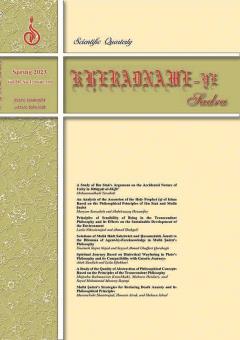Principles of Sensibility of Being in the Transcendent Philosophy and its Effects on the Sustainable Development of the Environment
Subject Areas : ملاصدراپژوهی و اندیشۀ حکمت متعالیهLaela Nikooienejad 1 * , Ahmad Shahgoli 2
1 - PhD in Islamic Philosophy and Kalam, Ilam University, Ilam, Iran
2 - Assistant Professor, Iranian Research Institute of Philosophy, Tehran, Iran
Keywords: sustainable development, environment, sensibility of being, nature, Mullā Ṣadrā,
Abstract :
The environmental crisis of the last two centuries is one of the most important problems threatening the human society and life. Accordingly, human beings should find a way to control the wrong and sometimes immoral acts that damage the environment. Mullā Ṣadrā believes that nature, objects, and inanimate bodies enjoy knowledge and intelligence; therefore, the Transcendent Philosophy follows a holy approach to nature. Accordingly, in this paper, the authors have tried to highlight the moral beliefs that could lead to sustainable development in the environment by emphasizing their divine-philosophical bases through resorting to firsthand sources by and on Mullā Ṣadrā and employing rational analysis and explanation. The findings of this study indicate that a scrutinizing rereading of the sources on the Transcendent Philosophy, which provides a comprehensive philosophical interpretation of various issues based on Qur’ānic verses and traditions, can contribute to protecting the environment. This is because, based on some principles such as the principiality of existence, gradedness of existence, commensurability of the cause and effect, and the nature’s being a manifestation of higher worlds, it is possible to regain the lost respect for nature and its dignity, which have been developed based on the holy perspective of religions and philosophical schools, and prevent the destruction of nature and, following it, the death of human life.
قرآن کریم.
ابنعربی، محییالدین (1405ق) الفتوحات المکیه، تحقیق عثمان یحیی، قاهره: الهیئة المصریة العامة للکتاب.
افلاطون (1351) تیمائوس، ترجمة محمدحسن لطفی، تهران: خوارزمی.
بیدهندی، محمد؛ شیراوند، محسن (1394) «بررسی اخلاق زیستمحیطی با پردازش نظریة گایا و قاعدة فلسفی بسیط الحقیقه»، انسانپژوهی دینی، شمارۀ 33، ص96ـ77.
جوادی آملی، عبدالله (1381) رحیق مختوم، ج2، قم: اسراء.
جوادی آملی، عبدالله (1386) رحیق مختوم، ج4 و 5، قم: اسراء.
حمیدی، امیرحسین و همکاران (1400) «جایگاه مصالح هوشمند بمنظور کاهش اثرات زیستمحیطی و افزایش طول عمر ساختمان»، سومین همایش ملی مدیریت دانش و کسب وکارهای الکترونیکی با رویکرد اقتصاد مقاومتی، تهران.
رضایی، ابراهیم؛ شانظری، جعفر (1396) «بررسی و تحلیل نسبت انسان با طبیعت در فلسفۀ ملاصدرا»، پژوهشهای فلسفیکلامی، شمارۀ 73، ص24ـ6.
سروش، عبدالکریم (1384) فربهتر از ایدئولوژی، تهران: صراط.
طباطبایی، سیدمحمدحسین (1417ق) نهایة الحکمة، تعلیق عباسعلی زارعی سبزواری، قم: مؤسسة نشر اسلامی.
کاپلستون، فردریک (1375) تاریخ فلسفه ، ج1: یونان و روم، ترجمۀ جلالالدین مجتبوی، تهران: سروش.
مصباح یزدی، محمدتقی (1375) دروس فلسفه، تهران: پژوهشگاه علوم انسانی و مطالعات فرهنگی.
مطهری، مرتضی (1373) مقالات فلسفی، تهران: صدرا.
ملاصدرا (1380) الحكمة المتعالية فى الأسفار الأربعة، ج2 و 7، تهران: بنیاد حکمت اسلامی صدرا.
ملاصدرا (1382) الحكمة المتعالية فى الأسفار الأربعة، ج9، تهران: بنیاد حکمت اسلامی صدرا.
ملاصدرا (1383) الحكمة المتعالية فى الأسفار الأربعة، ج1، 3 و 8، تهران: بنیاد حکمت اسلامی صدرا.
ملاصدرا (1386) مفاتیح الغیب، تصحیح و تحقیق نجفقلی حبیبی، تهران: بنیاد حکمت اسلامی صدرا.
ملاصدرا (1391) الشواهد الربوبية فى المناهج السلوكية، تصحيح و تحقیق سيد مصطفی محقق داماد، تهران: بنیاد حکمت اسلامی صدرا.
ملاصدرا (1397) الحكمة المتعالية فى الأسفار الأربعة، ج5، تهران: بنیاد حکمت اسلامی صدرا.
ملاصدرا (1398) الحكمة المتعالية فى الأسفار الأربعة، ج6، تهران: بنیاد حکمت اسلامی صدرا.
یخکشی، علی (1381) شناخت، حفاظت و بهسازی محیط زیست، تهران: موسسه علمیـکاربردی جهاد کشاورزی.
Barbour, I. G. (1997). Religion and Science: Historical and Contemporary Issues. New York: HarperSanFrancisco.
Butterfield, H. (1965). The Origins of modern science. New York: HarperSanFrancisco
Potter, V. R. (1971). Bioethics, bridge to the future. Englewood Cliffs: Prentice-Hall.
Rifkin, J. (1989). Entropy: Into the greenhouse World. New York: Bantam Books.

